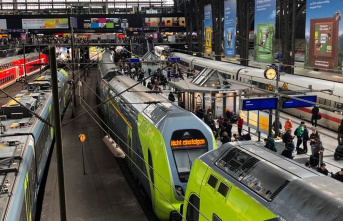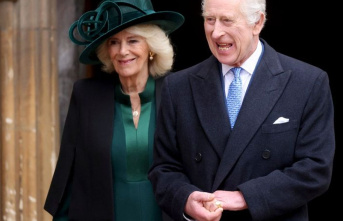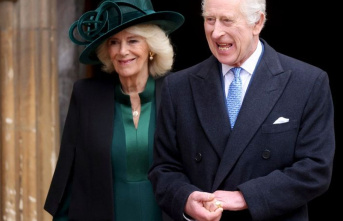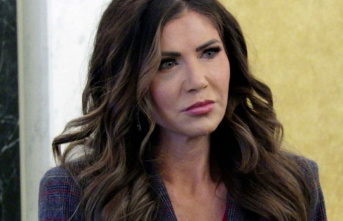Responding yesterday to a question about whether Finland's possible entry into NATO would pose a threat to Russia, Kremlin spokesman Dmitri Peskov said "definitely." He pointed out that "the expansion of the Alliance does not make the Eurasian continent more stable and secure." Peskov further warned that Moscow's response to Finland's entry into NATO "will depend on how close the Alliance's military infrastructure is to Russia's borders." "The situation will be analyzed and the necessary measures will be applied to guarantee our safety," he added.
The Russian presidential spokesman also deplored that "the United States has not made any attempt to resume negotiations with Russia in the last two months" and denounced that "in the talks with Ukraine there is nothing to boast about either."
"Everyone is trying to avoid a direct clash between Russia and NATO, but Russia will give a forceful response to anyone who tries to intervene" in the Ukrainian conflict.
The former president, former head of government and current vice president of the Russian Security Council, Dmitry Medvedev, warned yesterday through Telegram that "the countries of the Alliance, which fill Ukraine with weapons, train their troops to use Western equipment, send mercenaries and conduct maneuvers near our borders, they fuel the likelihood of a direct and open conflict between NATO and Russia." In his words, “such a conflict always has the risk of turning into a full-fledged nuclear war. That would be a disastrous scenario for everyone."
Last month, Medvedev already stressed on his Telegram account that if Finland and Sweden join NATO, the non-nuclear status of the Baltic region will have to be forgotten. He assured that if the two Scandinavian countries join the Atlantic bloc, “NATO's land borders with the Russian Federation will more than double in length. Naturally, the defense of these borders will have to be strengthened."
For its part, the Russian Foreign Ministry yesterday issued a statement warning that “Helsinki must be aware of the responsibility and consequences” of joining NATO and ending its neutrality status. "Russia will be forced to take retaliatory measures, both of a military-technical nature and of any other kind, in order to curb the threats to its national security that arise in this regard," reads the Russian diplomatic note.
With Finland's announcement, Putin's worst nightmare has begun to come true, a scenario in which NATO is closer to Moscow every day and in which its direct border with the Alliance increases by more than 1,300 kilometres. The Finnish president, Sauli Niinistö, and the prime minister, Sanna Marin, spoke out yesterday in favor of their country's entry into NATO and thus launched the application process, which will be formalized "in the coming days" and "as soon as possible," according to the Helsinki statement. This accession "is not directed against anyone," President Niinistö clarified, after Russia's warning of "political and military consequences" if Sweden or Finland took a single step in that direction. “You have caused this. Look in the mirror », was his response to Moscow. Prime Minister Marin also assumed that "if we take the step, we must prepare for risks and influences that are difficult to anticipate, such as an increase in tension on the border with Russia", as well as that "we will become the target of wide-ranging hybrid influence activities". scope". "We have no illusions, Russia will punish us," also accepts the president of the National Bank of Finland, Olli Rehn.
NATO sources have confirmed that the request will be accepted for processing immediately and that during the approximately one year that the process lasts "the allies will provide a greater presence of troops in the region, they will carry out more military exercises and maritime patrols in the sea Baltic, and will potentially send US and British forces to Finland and Sweden." All 30 current members must agree, but NATO Secretary General Jens Stoltenberg has repeatedly signaled there is broad support and Chancellor Scholz has publicly sponsored the process by inviting Marin and Andersson to a German cabinet meeting.
Probably for this reason, one of the first reactions from Moscow bears a hidden dedication to Germany: the suspension of the supply of Russian gas through the Polish Yamal gas pipeline, announced yesterday, and which branches out to the whole of Europe but mainly supplies Germany and which It is also a financial blow to Poland, a country that charges transit tolls. Moscow also announced sanctions that include several German subsidiaries of Gazprom Germania, which affect the country's largest gas storage facility, located in Rehden, Lower Saxony, and which represents around a fifth of the total capacity. The Economy Minister, Robert Habeck, calculated that they are "manageable" sanctions, but called on the population to reduce consumption, which, he said, "is everything now", Habeck pointed out that "if we achieve a consumption saving of 10% in the next two years we will have avoided entering an emergency situation».
Repsol's executive CEO, Josu Jon Imaz, also spoke in this regard, contributing yesterday to animating the intense debate within the EU about completely breaking ties with Russian gas. Specifically, the highest representative of the energy company expressed his concern about what may happen next winter and warned of Europe's dependence. "Today the 150 bcm of gas that Europe receives from Russia cannot be replaced." And he added that "there is no way to cover practically 40% of that gas" in Europe and that is going to cause "brutal tension."
But in Finland, the consequences that worry the most are the military ones. Since 2009, Stockholm and Helsinki have formed the Nordic Defense Community (Nordefco) together with the NATO countries Denmark, Norway and Iceland. And since May 2018 there is the so-called trilateral Declaration of Intent between Finland, Sweden and the US, which provides for cooperation in various military areas. Sweden and Finland are the two closest partner countries of NATO (Enhanced Opportunity Partners), which means high interoperability. But in anticipation of Russia's adverse reactions to its rapprochement with NATO, new steps have been taken in recent weeks. President Niinistö and British Prime Minister Boris Johnson signed a declaration of mutual security guarantee on Wednesday, in the face of a possible Russian aggression, also signed by Sweden and which implies a commitment to mutual military assistance in the event of an armed attack or a natural disaster. . The agreement also establishes greater bilateral cooperation in areas such as military intelligence, technology, arms purchases and joint military exercises. While awaiting NATO membership, Sweden has for its part proceeded to militarize the island of Gotland, a province 300 kilometers from Kaliningrad. Since January, Swedish Defense Minister Peter Hultqvist has sent hundreds of thousands of soldiers to reinforce the island and has distributed information leaflets among the inhabitants on how to act in the event of the outbreak of war.
2












